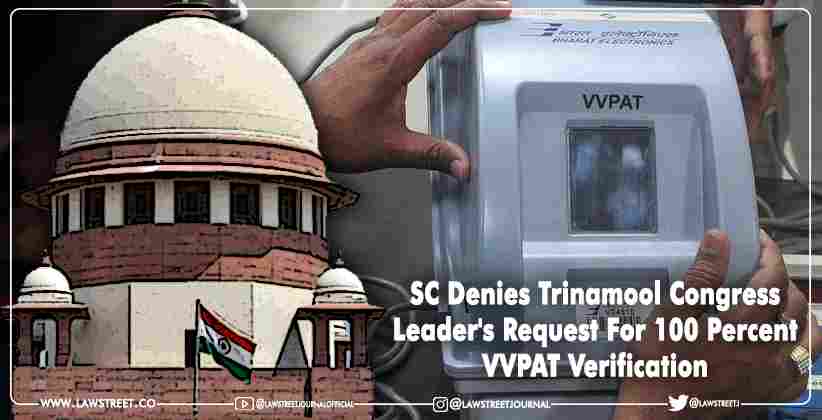


Amid the ongoing Indian Lok Sabha elections, the Supreme Court rejected all pleas for 100 percent verification of votes on Electronic Voting Machines (EVMs) through the Voter Verified Paper Audit Trail (VVPAT) method. The court emphasized the importance of maintaining trust and harmony among all pillars of democracy, while also acknowledging the need for meaningful criticism. The Election Commission of India has been asked to explain the steps of cross-verifying VVPAT slips with EVMs in order to uphold the sanctity of the electoral process. The use of VVPAT allows voters to confirm the accuracy of their votes, but its current implementation only covers a small percentage of EVMs. The dismissed petitions sought for every vote cast on EVMs to be cross-verified with VVPAT slips, amid widespread concerns about the security and reliability of the EVM voting system.
The Voter-Verified Paper Audit Trail (VVPAT) in India: A History of Contention
Background
The Electronic Voting Machines (EVMs) have been used in India since 2004 to replace the traditional ballot box system. However, the introduction of EVMs has been met with skepticism and concerns about the possibility of electoral fraud.
In 2013, the Supreme Court of India ordered the introduction of VVPATs as a safeguard to enhance the transparency and credibility of EVMs. VVPATs provide a physical trail of the vote cast, allowing voters to verify that their vote has been recorded correctly.
Current Scenario
Despite the implementation of VVPATs, concerns about the security and reliability of EVMs persist. Recently, there have been demands for 100% VVPAT verification of votes cast on EVMs during elections.
However, in the midst of the ongoing Lok Sabha elections, the Supreme Court rejected all pleas for 100% VVPAT verification. The court emphasized the importance of maintaining trust and harmony among all pillars of democracy while acknowledging the need for meaningful criticism.
Top 5 FAQs and Answers
1. What is VVPAT? A: VVPAT stands for Voter-Verified Paper Audit Trail. It is a system that provides a physical trail of the vote cast on an EVM. When a voter casts their vote, a slip is generated and displayed for a few seconds before it is dropped into a sealed box.
2. Why is VVPAT important? A: VVPATs provide a safeguard against electoral fraud by allowing voters to verify that their vote has been recorded correctly. It helps to maintain the transparency and credibility of EVM voting systems.
3. Why did the Supreme Court reject pleas for 100% VVPAT verification? A: The Supreme Court emphasized the importance of maintaining trust and harmony among all pillars of democracy. It also noted that the current level of VVPAT verification (50% randomly selected EVMs) is sufficient to detect any anomalies.
4. What is the current status of VVPATs in India? A: VVPATs are currently being used in all EVMs in India. However, the level of verification is 50% randomly selected EVMs.
5. What are the concerns raised about EVMs and VVPATs? A: Concerns about the security and reliability of EVMs and VVPATs include potential for tampering, hacking, and the possibility of vote manipulation. However, the Election Commission of India has repeatedly assured that these systems are tamper-proof and reliable.

Prime Minister Narendra Modi continued his tradition of celebrating Diwali with India's armed forces by visiting the INS Vikrant off the coast of Goa and Karwar. He praised the Navy personnel for their dedication towards the security of the nation and expressed his gratitude to the families of the brave soldiers. PM Modi also witnessed an impressive display of precision and prowess during an Air Power Demo on INS Vikrant, showcasing the technological excellence of the Indian Navy.

Prime Minister Narendra Modi celebrated Diwali 2025 with Indian Navy personnel aboard the indigenous aircraft carrier INS Vikrant, highlighting the ship's strength and psychological impact on adversaries. Commissioned in 2022, the carrier is a symbol of India's self-reliance and strategic resolve. PM Modi praised the bravery and dedication of the naval personnel, reinforcing the bond between the armed forces and the government.

The Allahabad High Court has directed the Jailer of Hisar Central Jail in Haryana to provide an explanation on how self-styled Godman Sant Rampal, currently held in the jail, is able to write and distribute books that allegedly target Hindu deities. This comes after a plea was filed by Hindu Front for Justice, calling for a ban on the books and action against Rampal. The petition alleges that the books contain offensive and provocative language and have been distributed through electronic communication platforms, causing disharmony between religious communities.

Following the latest string of scandals involving Prince Andrew, King Charles was photographed attending a Sunday morning service near his Scottish estate. The King wore a solemn expression as he drove to Crathie Kirk, displaying tension amidst a tumultuous time for the royal family. Recently, Prince Andrew announced his resignation from the Duke of York and membership of the Order of the Garter, the oldest chivalric order in the UK.

The nation's political leaders, including Prime Minister Modi, President Murmu, and Union Minister Amit Shah, took to social media to extend their warm wishes to the country on the occasion of Diwali. They highlighted the significance of the festival and urged people to celebrate it responsibly and with mutual love and harmony. EAM Jaishankar also wished everyone a happy and prosperous Diwali.

GB News journalist Nana Akua and royal fans are calling for King Charles to follow in Prince Andrew's footsteps and strip Prince Harry and Meghan Markle of their royal titles. This comes after the Duke of York voluntarily gave up his titles in light of the ongoing scrutiny surrounding his association with Jeffrey Epstein. Nana Akua ridiculed Meghan Markle's business ventures and urged the King to take away her Duchess of Sussex title in order to prevent her from setting foot in the UK again.

During a speech for Deepotsav 2025 celebrations in Ayodhya, Uttar Pradesh Chief Minister Yogi Adityanath criticized the opposition for denying Lord Ram's existence and obstructing the Ram Janmabhoomi Temple movement. He specifically called out the Congress for submitting an affidavit to the Supreme Court calling Lord Ram a myth and accused the Samajwadi Party of firing bullets at Ram devotees. Adityanath also emphasized the determination and resilience of the movement, which began in 1949 with the resolution "Ram Lalla Hum aayenge, Mandir wahin banayenge" and continues to this day.

Activists and advocacy groups staged massive demonstrations across the country in response to what they see as President Trump's abuse of power. With signs protesting policies such as mass deportations and the federal government shutdown, protestors showed a fierce love for their country. Though there were no reports of violence or arrests, Republicans labeled the demonstrations as "hate America" rallies. Organizers estimate that nearly 7 million people participated in over 2,700 cities and towns throughout the U.S., making it one of the largest reported one-day protests in American history.

With the 2025 Assembly Elections in Bihar on the horizon, the state's Araria constituency is gearing up for an intense revision of its electoral roll. This decision by the Election Commission aims to ensure that all eligible citizens are registered to vote in the upcoming elections. In the last election, the Congress emerged victorious in the constituency, but with no candidates declared yet, all eyes are on the official schedule for the 2025 Bihar Assembly Elections.

The Bharatiya Janata Party (BJP) in Andhra Pradesh marked Dhanvantari Jayanti with a colorful rally and speeches highlighting social inclusion, cultural heritage, and development. Leading state and district leaders, including BJP State president PVN Madhav, addressed the gathering and emphasized the party's commitment to equal respect for all religions and welfare initiatives for marginalized groups. At another event, Telangana BJP president Ramachandra Rao endorsed a proposed reservation for backward classes in Telangana and criticized the Congress and other parties for corruption while touting BJP's claim of clean governance.